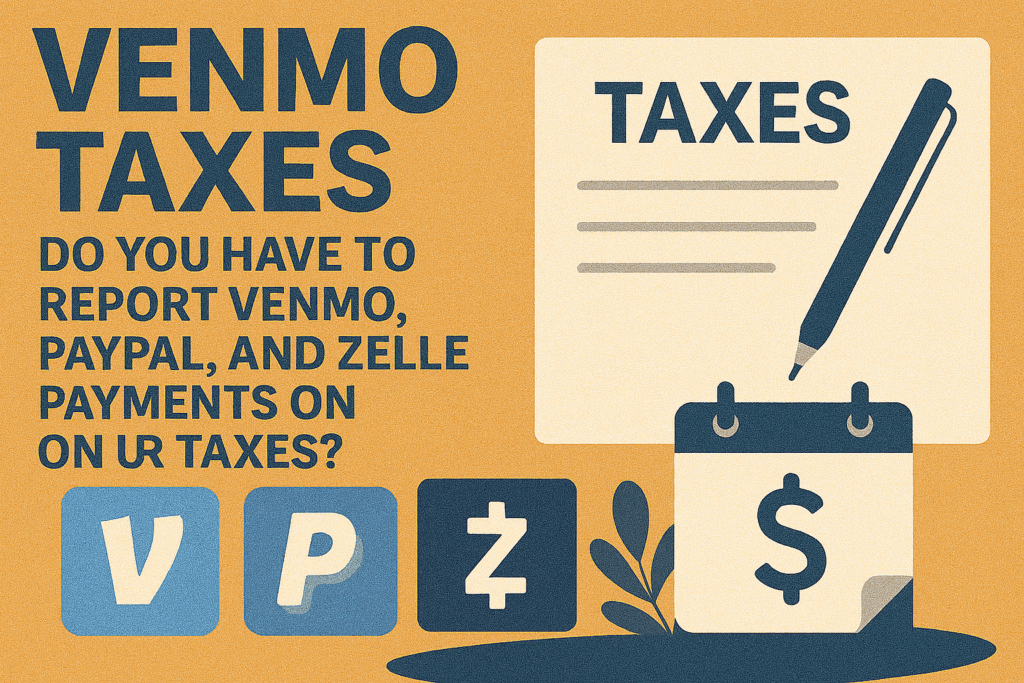
Venmo taxes
Venmo Taxes: Do You Have to Report Venmo, PayPal, and Zelle Payments on Your Taxes?
With more people using apps like Venmo, PayPal, and Zelle to send and receive money, a common question arises: What are Venmo taxes, and do you have to report Venmo, PayPal, and Zelle payments on your taxes? The IRS has increased scrutiny of digital payment apps, making it essential to understand how Venmo taxes and similar payment app transactions can affect your tax return in 2025.
Why Venmo Taxes Are On the IRS Radar
In recent years, the IRS has focused on closing the “tax gap,” and Venmo taxes are part of that effort. The 2021 American Rescue Plan lowered the reporting threshold for third-party payment processors, including Venmo, PayPal, and Cash App.
Previously, platforms issued a Form 1099-K only if you received over $20,000 and more than 200 transactions. Now, the threshold is just $600 per year, regardless of the number of transactions. Although the IRS has delayed full implementation of this rule, taxpayers are still required to report all taxable income — even if no form is issued. You can learn more about Form 1099‑K requirements directly from the IRS 1099-K information page.
Understanding Venmo Taxes: What Payments Are Taxable?
The key to understanding Venmo taxes is knowing what counts as taxable income. Payments you receive through Venmo, PayPal, or Zelle for goods, services, freelancing, or business activities are taxable and must be reported on your tax return.
- Taxable payments include:
- Freelance or gig work
- Business sales or services
- Side hustle income
- Non-taxable payments include:
- Personal gifts
- Reimbursements for shared expenses
- Transfers between your own accounts
Even if you don’t receive a 1099-K form, the IRS expects you to report taxable income from Venmo and other apps.
Venmo Taxes and the 1099-K Form
If you receive payments above the reporting threshold through Venmo or PayPal, you’ll likely receive a Form 1099-K by January 31 of the following year. The 1099-K reports your gross payments — it does not subtract fees, refunds, or returns. You are responsible for calculating and reporting your net taxable income.
For example, if you earn $5,000 through PayPal selling crafts, your 1099-K will show $5,000. You can then deduct your legitimate business expenses (like materials, shipping, and fees) to calculate your net income for taxes.
Do You Have to Report Zelle Payments for Venmo Taxes?
Many people wonder about Zelle payments and Venmo taxes. Unlike Venmo and PayPal, Zelle does not currently issue 1099-K forms because it operates as a direct bank transfer service. However, the same rules apply: taxable income must still be reported. The IRS can access your bank records if needed, so it’s crucial to include Zelle business income on your return.
Common Questions About Venmo Taxes, PayPal Taxes, and Zelle Taxes
1. What if I use Venmo only for personal transfers?
If you’re reimbursing a friend or sending a gift, these payments are not taxable and are not included in Venmo taxes. Clearly label personal transactions to avoid confusion.
2. I didn’t get a 1099-K — do I still need to pay Venmo taxes?
Yes. Even without a 1099-K, you’re responsible for reporting all taxable income, including income from Venmo, PayPal, and Zelle.
3. How can I prove which Venmo payments are personal?
Maintain clear records, and consider using separate accounts for business and personal transactions. Document all payments with notes and receipts where possible.
4. What happens if I don’t report Venmo taxes?
Failing to report taxable income can result in IRS penalties, interest, and audits. The IRS uses advanced analytics to identify unreported income, including payments from apps.
Tips for Managing Venmo Taxes and Payment App Income
Here are steps you can take to manage Venmo taxes and stay compliant:
- Separate accounts: Use a dedicated account for business income on Venmo, PayPal, and Zelle.
- Track all income: Keep detailed records of all payments and related business expenses.
- Save receipts: Document all deductible expenses to reduce taxable income.
- Pay estimated taxes: If you have significant side income, pay quarterly taxes to avoid penalties.
- Work with a tax professional: They can help you navigate Venmo taxes and maximize deductions.
How to Report Venmo Taxes on Your Tax Return
If you earn income through Venmo, PayPal, or Zelle, report it properly on your tax return:
- Report self-employment income on Schedule C (Form 1040).
- Pay both income tax and self-employment tax on your net business income.
- Include all taxable income, even if below the 1099-K threshold or no form is issued.
Remember: the 1099-K shows gross payments, so you can deduct business expenses to calculate your taxable income.
The Bottom Line on Venmo Taxes
Understanding Venmo taxes is more important than ever. If you receive payments through Venmo, PayPal, or Zelle for goods or services, it counts as taxable income — even without a 1099-K. To avoid IRS problems, track your income, keep excellent records, and report everything accurately. When in doubt, consult a tax professional who understands payment app reporting rules and visit the IRS’s official Form 1099-K guidance for additional details.
Disclaimer: The information provided in this blog post is for informational purposes only and should not be construed as legal, tax, or accounting advice. Tax situations are often complex and highly specific to the individual or business. You should contact a qualified tax expert directly to discuss your particular circumstances. Nothing herein is intended to, nor does it, create an attorney‑client or advisor‑client relationship. For individual guidance, please contact us directly.


